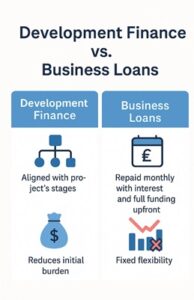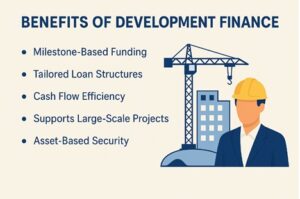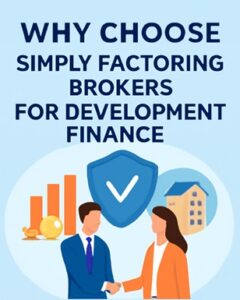What is Development Finance?
When it comes to growing a business, access toward capital is necessary whether you’re building a new commercial space, expanding operations, or entering new markets. This is truly where Development Finance enters into the scene since it offers more tailored funding solutions for property developers as well as entrepreneurs with growing companies. Development finance caters specifically to unique needs of projects expanding businesses unlike conventional loans.

In this blog, we’ll explore development finance and explore it. We will also discuss how it differs from business loans as well as which finance options are available, including factoring, secured finance, and factoring & trade solutions. This guide can help you reach toward well-educated funding decisions, whether you’re scaling a small business or developing property.
Key Characteristics
- Tailored to the development timeline
- Funds released in stages as milestones are met
- Commonly secured against the project property
- Suitable for residential and commercial developments
When to Use Development Finance
- Purchasing land for construction
- Refurbishing a commercial building
- Expanding business infrastructure
- Financing long-term phased projects
Beyond Traditional Business Loans
Development finance is more dynamic than typical loans, repaid monthly with interest and requiring full funding upfront. It’s structured in a way that it aligns with the project’s timeline and cost stages. This ensures your venture stays on track while reducing the initial financial burden in addition to freeing up working capital for businesses.

Small businesses often seek customary business loans. Their main funding source exists here. Though effective sometimes, they often lack flexibility and scale needed for heavy-development projects. Conversely, finance for development is planned. Your needs cause it to evolve.
Business loans often cover typical expenses, yet development finance aims at property objectives or focused growth.
For business loans, there are fixed repayment plans. The terms in development finance are often tailored as the projects complete their various stages.
Benefits of Development Finance
Development finance isn’t only just about the funds but is also about the rightly supporting project-driven growth. It stands out because of this reason.

- Milestone-Based Funding: Funds are released in phases because this reduces waste along with encouraging progress.
- Tailored Loan Structures: Loans are customized for alignment with the timeline of your development. Their structures are adjusted for meeting your scope.
- Cash Flow Efficiency: You do not need for you to front all of the capital all at once, and this frees up cash for other business needs.
- Supports Large-Scale Projects: It supports large-scale projects also and is ideal for infrastructure expansion. It is a thing that property developers will find to be helpful.
- Asset-Based Security: Asset-Based Security usually remains secure against development alone needing no extra business collateral.
Flexible Finance Options to Fit Every Stage
Businesses must offer company assets upon securing loans. These loans do have collateral requirements. Usually, finance for development is secured as against the property. It also can be secured against the project that is itself.
Businesses frequently use development finance with different funding options. This leads toward better outcomes than solely relying on customary loans.
You gain one major advantage when you do work with specialists such as Simply Factoring Brokers because you are able to access more diverse finance options that do cater to more various business stages and more needs. These options include:
Factoring means you sell unpaid invoices to a provider who pays you upfront therefore improving cash flow without waiting 30, 60, or 90 days for payments. Firms that are on long-term projects find that it is useful for them, especially in logistics and also in construction.
Secured Finance: De-risking Your Growth Strategy
In Secured Finance model, loans are secured with assets including equipment, property, or even invoices. Lenders face less risk from this. Borrowers usually benefit with more favourable interest rates.
Businesses can obtain the needed working capital in order to pay suppliers through the hybrid Factoring & Trade Finance solution while they are awaiting payments from customers; this solution combines invoice factoring with trade finance. Manufacturers, exporters and importers will find it to be ideal.
Each of these choices improves your development finance package or works apart from it, so you can shape a funding mix suiting your immediate aims and eventual targets.
Why Choose Simply Factoring Brokers for Development Finance?

As businesses scale, risks grow more meaningful. Even of the most carefully of planned projects it can derail because there are delays within construction as well as supplier issues, or shifts of an unforeseen economic nature. Finance that is secured shines in that location-giving borrower and lender peace of mind because of that.
Unlock higher funding limits with more competitive rates via leveraging either your project property or any of your existing assets acting as security. This ensures you don’t overstretch your cash or incur debt that’s out of alignment with your risk profile. Business liquidity isn’t sacrificed by this smart way to support ventures.
Factoring Brokers platforms simply pair businesses and lenders giving custom solutions that reduce risks.
📊 Visual Comparison: Development Finance vs Other Finance Options

Graph: Comparing Features of Development Finance, Business Loans, Factoring, and Secured Finance
Driving Business Growth with Development Finance
This bar graph illustrates how four major finance options stack up across five key attributes:
- Flexibility
- Funding Speed
- Collateral Requirement
- Purpose Specificity
- Cash Flow Benefit
Highlights:
- Development Finance scores highest for Purpose Specificity and Flexibility, as it’s tailored for staged property or project funding.
- Factoring stands out for Cash Flow Benefit, offering fast liquidity through invoice conversion.
- Secured Finance performs well in terms of Collateral-Based Security, offering larger loans at lower interest when backed by business assets.
- Business Loans offer general-purpose funding but score lower on flexibility and project alignment.
Breakdown of Each Comparison Criteria
1. Flexibility
- Development Finance (9/10): Offers highly customizable funding—money is released in phases based on project milestones.
- Factoring (7/10): Flexible as it unlocks immediate working capital from invoices.
- Secured Finance (6/10): Some flexibility in how funds are used, but repayment terms are often stricter.
- Business Loans (5/10): Less flexible; usually have rigid terms, fixed schedules, and one-time disbursement.
2. Funding Speed
- Factoring (9/10): Fastest among all—usually funded within 24–48 hours after invoice approval.
- Development Finance (6/10): Requires due diligence and appraisal, so not instant but faster than banks in many cases.
- Business Loans (5/10): Moderate approval time; banks may take days to weeks.
- Secured Finance (5/10): Collateral verification can slow down funding.
3. Collateral Requirement
- Secured Finance (10/10): Heavily reliant on collateral—business equipment, vehicles, or properties.
- Development Finance (8/10): Typically secured by the property or land being developed.
- Business Loans (6/10): May be unsecured or lightly secured, depending on creditworthiness.
- Factoring (5/10): Relies on invoices rather than physical assets—moderate collateral pressure.
4. Purpose Specificity
- Development Finance (10/10): Designed strictly for development projects (real estate, construction, infrastructure).
- Secured Finance (7/10): Generally supports asset acquisition or debt restructuring.
- Factoring (6/10): Works well for maintaining cash flow but not for specific capital-intensive projects.
- Business Loans (5/10): Suitable for general business use, not targeted to project-specific stages.
5. Cash Flow Benefit
- Factoring (10/10): Directly boosts cash flow by converting unpaid invoices to cash.
- Development Finance (6/10): Helps manage expenses over time without straining cash reserves.
- Secured Finance (5/10): Can support cash flow, but long-term repayment may offset benefits.
- Business Loans (4/10): Can become a cash flow burden due to fixed monthly repayments.
How Development Finance Works
Development finance is not released in a lump sum. Instead, it follows a stage-based funding structure, aligned with the project’s progress. The table below illustrates how funds are typically released throughout a development project:
Funding Stages and Timeline
| Project Stage | Description | % of Funds Released |
|---|---|---|
| Land Acquisition | Used to purchase the land where the development will take place | 10%–20% |
| Groundwork & Foundation | Covers excavation, groundwork, and laying the foundation | 20%–25% |
| Structural Build | Funding released during major construction phases (walls, roofs, framework) | 25%–30% |
| Internal Work | Includes plumbing, electrical wiring, plastering, and insulation | 15%–20% |
| Finishing & Completion | Used for final touches like painting, flooring, and inspections | 10%–15% |
Final Thoughts
The financial world can overwhelm you—but it doesn’t need to at all. With Simply Factoring Brokers, a financial partner, not just access to capital, you are indeed getting. It is for these reasons that they stand out.
Tailored Funding Solutions finds for you just the right lender that fits all of your needs. Simply Factoring Brokers does this even in the event that you’re building new properties or are scaling operations.


